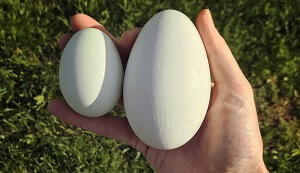How Much Do Goose Eggs Cost?
Last Updated on January 16, 2024
Written by CPA Alec Pow | Content Reviewed by ![]() CFA Alexander Popinker
CFA Alexander Popinker
Goose eggs occupy a small but growing niche in the specialty egg market. With their large size, savory flavor, and high nutrient content, goose eggs have caught the attention of gourmet foodies and small farmers alike.
But what exactly determines the cost of a goose egg? This article will explore the unique world of goose egg economics.
We’ll cover everything from goose breeding specifics to consumer demand trends. You’ll gain insight into the inputs, risks, and returns of raising geese for egg production.
Whether you’re an aspiring hobby farmer or just curious about why that goose egg costs triple the price of a chicken egg, read on to satisfy your interest!
How Much Do Goose Eggs Cost?
Usually, a goose egg costs between $4 and $6, with two overlapping groups of people primarily buying them: High-end restaurants and bakeries use goose eggs for gourmet preparations, and farm-to-table food enthusiasts and home gourmet cooks,
Pasture-raised goose eggs wholesale for $15-25 per dozen. At high-end grocers like Whole Foods, it’s not uncommon to see individual goose eggs retail priced at $5-$7 each.
Personal homestead goose egg production sees greatly reduced input costs but still typically costs 2-3 times more overall than equivalent chicken egg output.
Restaurant menus provide another illustration of real-world pricing dividends. Upscale establishments think nothing of charging $15 for a brunch dish featuring a single goose egg. Menus strategically position goose eggs as a premium ingredient that deserves both a tasty flavor experience and price tag to match.
The Backyard Chicken mentions that social media has had sellers offering goose eggs for $2-$3 per egg, and one online website was selling goose eggs for $7 each.
Factors Affecting the Cost of Goose Eggs
Many overlapping factors influence the retail pricing of goose eggs compared to more common chicken eggs.
Breed Matters
Goose breeds are divided into three size classes – heavy, medium, and light. Heavy breeds like Toulouse geese produce the largest eggs but require more expensive enclosures and have lower egg production overall.
Organic and Free-Range
As consumer demand grows for ethically produced, organic, and free-range eggs, meeting certification standards for humane, sustainable goose egg farming can be expensive.
Regionality
The limited number of goose egg producers compared to industrial chicken farms means fresh goose eggs are often only found in local farmers’ markets. The lack of widespread distribution networks drives up costs through production, storage, and transport.
You might also like our articles about the cost of quail eggs, chicken eggs, or duck eggs.
Specialty Market
Sold alongside other gourmet ingredients like specialty oils, cheeses, and cured meats, goose eggs find themselves in the “high-end” shopping category. The perception as a luxury, artisanal good means higher profit margins for farmers and retailers.
Operating Costs: Raising Geese for Egg Production
Acquisition Costs – Gosling prices range wildly based on breed, bloodline, and egg-laying promise. Mature breeder geese for starting a flock cost $200+ per breeding pair.
Enclosures and Housing – Unlike chickens, geese cannot be kept in basic coops and require more durable shelter from predators. Water access for swimming and grass/gravel yards must be provided.
Equipment and Utilities – Specialized water containers, custom nest boxes, egg baskets, heating, ventilation, lighting, and other electrical costs also add up.
Feed and Treatments – It takes approx. average $90-$120 to feed one goose per year. Supplementing grass grazing with high protein feeds keeps egg production levels up. Vaccinations and basic medical care ensure a healthy flock.
Labor and Maintenance – Daily egg collection, cleaning enclosures, managing pasture rotation; no automation like chicken coops means hands-on labor carries additional costs.
Why Goose Egg Production Struggles to Grow
If goose eggs provide farmers with guaranteed sales, what obstacles prevent more poultry producers from adding geese to their offerings?
Low Volumes and Longevity
 Geese lay just 40-60 eggs per year at best, less than 1/10th of the 300+ eggs from today’s elite chicken hybrids…It takes approx. 3 years before geese hit peak laying productivity. The delayed returns can discourage those with limited space and resources.
Geese lay just 40-60 eggs per year at best, less than 1/10th of the 300+ eggs from today’s elite chicken hybrids…It takes approx. 3 years before geese hit peak laying productivity. The delayed returns can discourage those with limited space and resources.
Climate and Space Constraints
Geese thrive in temperate regions with grass pastures and room to roam. Warmer southern climates and smaller farms don’t always accommodate geese. Sites requiring supplemental water and shade systems add to startup costs.
Predators and Disease Vulnerability
Foxes, coyotes and other predators can decimate free-range geese. And geese often fall victim to common avian illnesses more easily than hardy chicken flocks. Losing an expensive breeding goose impacts the bottom line.
Perceptions and Competition
Consumers perceiving eggs as “just eggs” aren’t yet willing to pay specialty egg prices, and large-scale commercial chicken farms offer cheaper eggs without question. Out-educating buyers on nutrition and ethics can be an uphill battle.
Goose Egg Basics
Goose eggs boast several key differences from their chicken egg counterparts.
Goose eggs come in sizes ranging from 5-7 ounces on average, over triple the weight of large chicken eggs. Their shells are thicker as well. When cracked open, goose eggs reveal a larger yolk and white, with a richer flavor resembling a custard or cream.
The higher fat and nutrient content make goose eggs excellent for baking. The large size lends itself to culinary applications like braising goose eggs or intricate stuffing compositions.
Evaluating Your Goose Egg Economics
Raising geese for profitable egg production requires careful planning and investment. But niche market demand continues growing to support dedicated goose breeders.
Before jumping in, be sure to thoroughly assess your property limitations, available time commitments, and access to regional foodie customers.
Under optimal conditions, hobby-scale goose egg ventures can sustain themselves and even turn modest profits. However, tempering short-term expectations is wise, as geese take time to mature and relay a spectrum of operational costs compared to standard chicken egg production.
Frequently Asked Questions
How much do goose eggs typically cost compared to chicken eggs?
Goose eggs typically retail for $4-6 per egg, over triple the average price of even organic, free-range chicken eggs at around $1.50-2 per egg.
This substantial price premium is driven by higher input costs, more intensive labor requirements, lower supply levels, and positioning as a specialty/gourmet ingredient.
What factors influence the price of goose eggs?
The main factors that directly impact goose egg pricing are breeding stock costs, specialized equipment needs to house/contain geese, supplemental feed, certification standards if raising organically/free-range, capacity constraints, seasonal variability, regional distribution reach, niche market demand trends, and most importantly – the higher hands-on labor investment required for goose welfare and egg harvesting compared to semi-automated chicken egg production systems.


Leave a Reply
Want to join the discussion?Feel free to contribute!